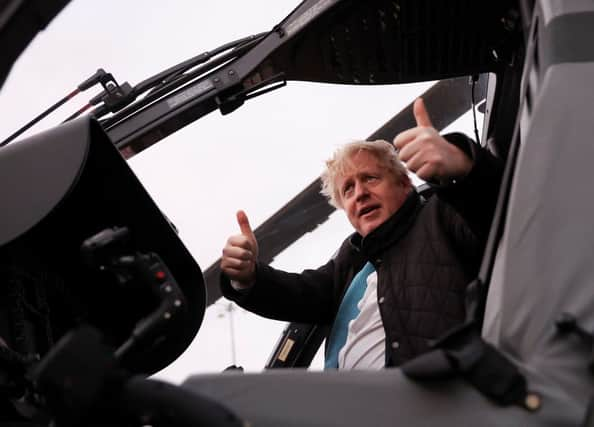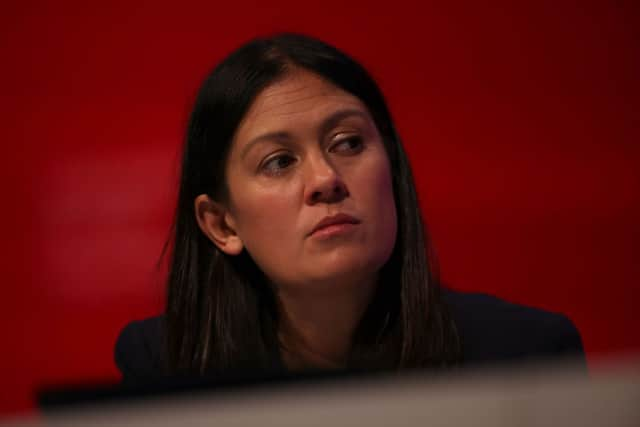PM and Chancellor: ‘National insurance hike necessary despite cost of living crisis’
This article contains affiliate links. We may earn a small commission on items purchased through this article, but that does not affect our editorial judgement.


A controversial planned rise to National Insurance is going ahead despite concerns about the cost of living crisis, Boris Johnson and Rishi Sunak have said.
In a jointly penned article for The Sunday Times, the Prime Minister and Chancellor said the “progressive” policy was necessary to “clear the Covid backlogs” in health and social care.
Advertisement
Hide AdAdvertisement
Hide AdTheir public show of unity comes as pressure continues to grow on Mr Johnson over the investigation into Downing Street parties by civil servant Sue Gray.
Senior backbench Conservative MP Tom Tugendhat has put himself forward as a candidate should a Tory leadership vote be called, while Mr Sunak and Foreign Secretary Liz Truss are also believed to be putting the final touches to their own leadership bids.


At a glance: 5 key points
In their joint article, Mr Johnson and Mr Sunak wrote of the planned NI hike: “We must clear the Covid backlogs, with our plan for health and social care – and now is the time to stick to that plan. We must go ahead with the health and care levy. It is the right plan.”
“It is progressive, in the sense that the burden falls most on those who can most afford it,” the pair wrote. “Every single penny of that £39 billion will go on these crucial objectives – including nine million more checks, scans and operations, and 50,000 more nurses, as well as boosting social care.”
It means that in April, National Insurance will rise 1.25 percentage points for both workers and employers. From 2023, NI will fall back to its current rate, with a separate 1.25% health and social care levy then applied to raise funds for improvements to care services.
Mr Johnson and Mr Sunak added they were both “tax-cutting Conservatives”, but there is “no magic money tree”. They said: “We believe passionately that people are the best judges of how to spend their own money. We want to get through this Covid-driven phase, and get on with our agenda, of taking advantage of our new post-Brexit freedoms to turn the UK into the enterprise centre of Europe and the world.”
The move has met with cross-party criticism given the tax hike is taking place during a cost of living crisis that has seen energy costs rise significantly and the price of a household shop jump to a near-30 year high.
The £12bn National Insurance rise was first announced by the Government in September, and broke a Conservative 2019 manifesto promise to not raise any of the major national taxes.
At the time, Mr Johnson justified the move, saying that the "[Covid] pandemic was in nobody’s manifesto".
Advertisement
Hide AdAdvertisement
Hide AdIt proved unpopular among Conservative backbenchers when it was voted on, and has become something of a bargaining chip in recent weeks after the PM’s authority in his party was severely weakened by the Downing Street Party scandal.
Political opposition to NI hike
Politicians from across the political spectrum have voiced their disapproval of the NI hike plans.
Labour has regularly voiced criticism over the fiscal move, with party leader Sir Keir Starmer calling it the “wrong thing to do”.
Speaking to the BBC’s Sunday Morning politics programme Labour’s shadow levelling up secretary Lisa Nandy urged the Government to “rethink” the planned rise.
Advertisement
Hide AdAdvertisement
Hide Ad“You can’t possibly hit people with more taxes at the moment. It’s just simply not possible for a lot of people to survive,” she said.
“The stories that I’m hearing from people across the country about the sacrifices they’re going to have to make are enormous.”


Conservative backbencher Robert Halfon said the Government should “go back to the drawing board” and look at different ways to find money that is needed for the health service.
He also said that struggling families need support and using the £4 billion that has been raised from cutting overseas aid, or other taxes, could be used to help them.
Advertisement
Hide AdAdvertisement
Hide Ad“I have suggested that the Government looks at windfall taxes on big business, particularly oil companies for example who have been raking it in over the past couple of years, to perhaps increase capital gains tax as well – so that we can raise those funds for the NHS without hitting low-income workers,” Mr Halfon told Trevor Phillips on Sunday.
Still no Sue Gray report
The continued debate over the National Insurance rise comes as the UK continues to wait for the highly anticipated Sue Gray report into Downing Street parties.
No. 10 says it has still not received a copy of the civil servant’s report.
On Saturday (29 January), backbench Tory MP Tom Tugendhat became the first to announce that he intends to stand for leader if there is a contest soon.
Advertisement
Hide AdAdvertisement
Hide AdRishi Sunak and Liz Truss are frontrunners to win the top job if Boris Johnson is kicked out of office.
The Independent has reported that the Chancellor was putting the final touches to a leadership bid after telling allies he believed the scandal over alleged parties in Downing Street and Whitehall could be “unsurvivable” for the PM.
But the newspaper cited a source close to Mr Sunak as saying these claims were “totally false”.
Reporting by PA